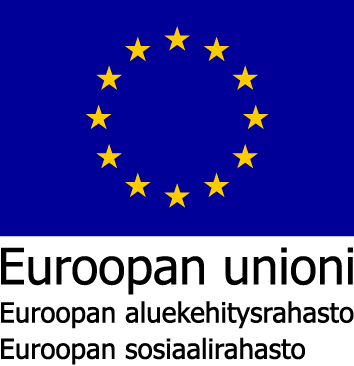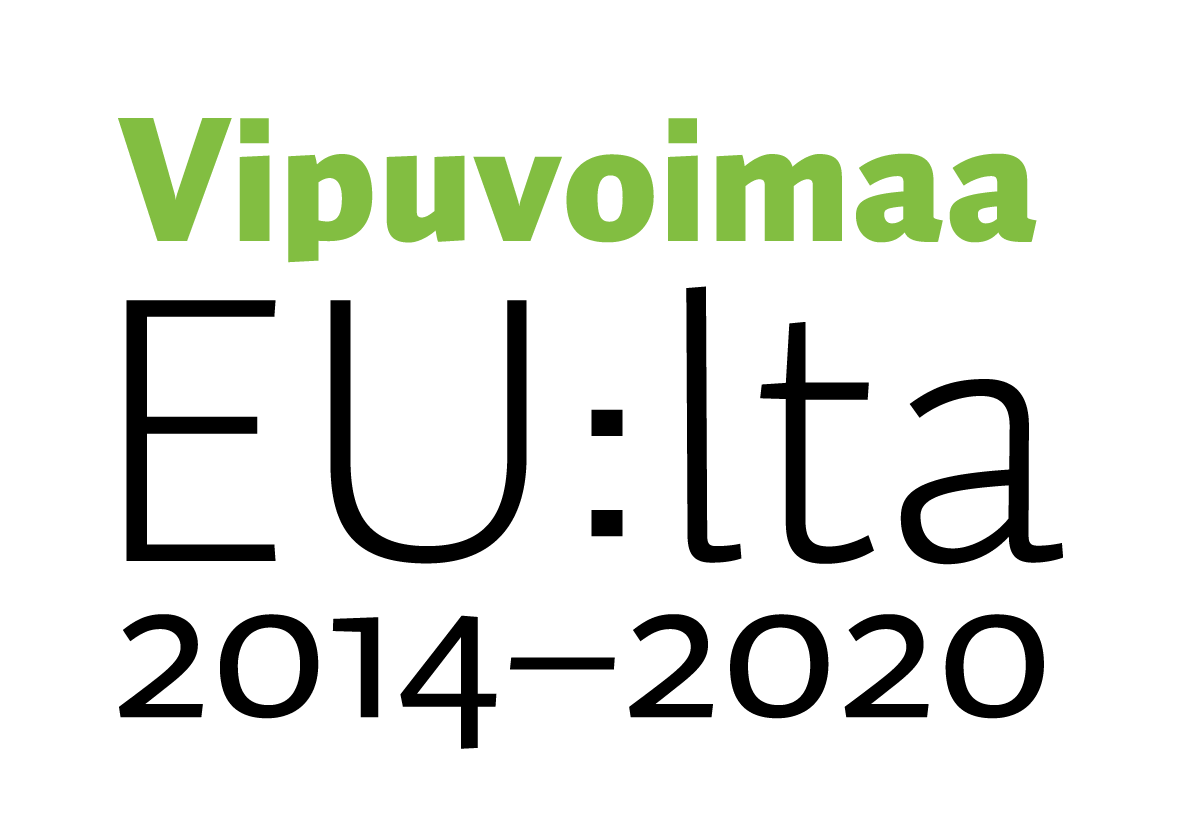

 |
 |
Hankekoodi: S22121
Hankkeen nimi: Pienemmästä isommaksi ja vahvemmaksi
Toimintalinja: 3. Työllisyys ja työvoiman liikkuvuus
Erityistavoite: 7.1. Tuottavuuden ja työhyvinvoinnin parantaminen
Suunnitelman mukainen toteutusaika: Alkaa 1.6.2020 ja päättyy 28.2.2021
Toiminnan tila: Toiminta päättynyt
Vastuuviranomainen: Pohjois-Pohjanmaan elinkeino-, liikenne- ja ympäristökeskus
Hakijan virallinen nimi: Elinkeino-, liikenne- ja ympäristökeskusten sekä työ- ja elinkeinotoimistojen kehittämis- ja hallintokeskus
Organisaatiotyyppi: Valtion viranomainen
Y-tunnus: 2296962-1
Jakeluosoite: PL8060
Puhelinnumero: 0206360010
Postinumero: 96100
Postitoimipaikka: Rovaniemi
WWW-osoite: http://www.ely-keskus.fi/lappi
Hankkeen yhteyshenkilön nimi: Perälä Marja
Yhteyshenkilön asema hakijaorganisaatiossa: Johtaja
Yhteyshenkilön sähköpostisoite: marja.perala(at)ely-keskus.fi
Yhteyshenkilön puhelinnumero: +358 295 037 050
Hakijoiden lukumäärä tai tuen siirto -menettely:
Yritystoiminnan pysähtyminen, kassakriisi ja huoli toimeentulotuesta ovat horjuttaneet merkittävissä määrin yrittäjien jaksamista ja hyvinvointia. Yrittäjälle oma jaksaminen ja hyvinvointi ovat keskeisiä kulmakiviä yrityksen toimintaedellytysten ja menestymisen kannalta. Yrittäjien jaksamisella on myös suora vaikutus siihen, miten yritykset kykenevät nousemaan takaisin jaloilleen korona kriisin jälkeen.
Maan hallitus on pyrkinyt kompensoimaan yritysten taloudellisia menetyksiä poikkeusrahoituksilla sekä yrittäjien työttömyysturvaoikeuden väliaikaisella laajentamisella. Toimenpiteillä on voitu jossakin määrin lievittää yritysten akuuttia hätää ja ne ovat mahdollistaneet työnantajayrityksille mahdollisuuden saada rahoitusta yrityksen kehittämistoimenpiteisiin. Käytännössä tähän mahdollisuuteen ei ole kaikilla yrityksillä ollut valmiuksia tai tarpeen mukaisia voimavaroja.
Pienestä isommaksi ja vahvemmaksi -hankkeen keskeisenä tavoitteena on edistää yritysten keskinäistä yhteistyötä ja koota yritysryhmiä. Yritysryhmille tarjotaan niiden tarvitsema tuki ja ohjaus toiminnan käynnistymiseksi sekä sähköinen olemassa oleva alusta yritysten keskinäiselle kohtaamiselle sekä yritysten, oppilaitosten ja yrityspalvelutoimijoiden kohtaamisille.
Hankkeessa tuetaan yrittäjien jaksamista ja hyvinvointia sekä tuottavuuden myönteistä kehittymistä tarjoamalla vertaistukea sekä mahdollisuutta yhteiskehittämiseen. Hankkeen kohderyhmänä ovat mikro- ja pk-yrittäjät, joille verkostoituminen voi tuottaa lisäarvoa liiketoiminnalle tai/ja yrittäjälle itselleen.
Hankkeen lähtökohta on, että yritykset yhdessä muiden vastaavassa tilanteessa olevien kanssa muodostavat yhteisen tilannekuvan sekä miettivät sen pohjalta tulevaisuutta ja mahdollisia kehittämistoimenpiteitä. Kantavana ajatuksena on, että verkostoitumalla pienistä yrityksistä voi tulla isompia ja vahvempia. Isompana ja vahvempana yrityksillä on paremmat edellytykset turvata yritystoiminnan jatkuvuus heti kriisin jälkeen sekä kohdata toimintaympäristöstä mahdollisesti nousevia muutostekijöitä paremmin.
Tulevaisuuteen suuntaamiseksi tämä hanke tarjoaa tuen ja ohjauksen syntyville verkostoille, ohjaa yrityksiä palvelutarpeiden mukaisiin palveluihin oikea-aikaisesti sekä tukee yritysten yhteiskehittämistä palvelumuotoilulla. Hanke tekee asiakasohjausta lisäksi sen rinnalla toimiviin hankkeisiin, joissa tarjotaan työkaluja digitaaliseen liiketoimintaosaamiseen sekä yrittäjäosaamisen vahvistamiseen.
Hankkeessa yritysryhmät itse määrittävät toiminnan tai palvelun kehittämisen sisällön. Kehittämisen tueksi on käytettävissä seudullisten yrityspalvelutoimijoiden sekä oppilaitosten osaaminen ja palvelut. Uutena palveluna kokeillaan palvelumuotoilun mahdollisuuksia tuottaa lisäboostia yritysverkostolle.
Palvelumuotoilua hyödyntäen yritykset voivat yhdessä suunnitella asiakaslähtöisiä palveluja/tuotteita/prosesseja/toimintoja monikanavaisesti hyödyntäen digitalisaation mahdollisuudet. Nämä palvelumuotoiluosaajat hankitaan yritysryhmien käyttöön ostopalveluna.
Hankkeella edistetään myös yritysten, oppilaitosten ja seudullisten yrityspalvelutoimijoiden keskinäistä yhteistyötä sekä järjestetään erilaisia tilaisuuksia/tapahtumia, jossa näitä toimijoita törmäytetään toistensa kanssa. Oppilaitokset voivat tarjota käytössää olevia innovaatioympäristöjään kehittämisen tukena. Hankkeen uskotaan mahdollistavan seudullisten yrityspalvelutoimijoiden osaamisen kehittymisen verkostomaiseen toimintatapaan.
Hankkeen keskeisin tulos on, että yrittäjien voimavarat vahvistuvat niin, että yrittäjät voivat palata yrityksiinsä jatkamaan yritystoimintaa välittömästi rajoitustoimenpiteiden päättyessä. Hankkeen myötä syntyy myös alustava toimintamalli verkostoitumiselle, jota voidaan hyödyntää ja jatkokehittää. Lisäksi hankkeen tuloksena syntyy sellaisia pysyviä yritysverkostoja, jotka tuottavat lisäarvoa toisilleen ja mahdollistavat yritysten kasvun, kehittymisen sekä vahvistumisen.
Tämä Lapin ELY-keskuksen hallinnoima hanke toimii sateenvarjohankkeena (yhteistyöhankkeena) kahdelle muulle ESR-hankehaussa mukana olevalle hankkeelle. Hankkeet ovat Koronakriisin yli ja eteenpäin ja Digijump - digitaalisen liiketoiminnan kehittäjä.
Lisäksi näiden rinnalle on mahdollisesti syntymässä muita täydentäviä hankkeita, joiden palvelut ovat myös tähän hankkeeseen osallistuville yrityksille ja yritysryhmille. Yhteistyöhankkeiden kesken tehdään tiivistä yhteistyötä. Hankkeen projektipäälliköt muodostavat operatiivisen "johtoryhmän", jolla varmistetaan käytännön yhteistyö ja asiakasohjauksen toimivuus
Hankkeen kohderyhminä ovat koronakriisin yhteydessä vaikeuksiin joutuneet mikro- ja pk- yrittäjät ja yritykset sekä yrittäjät ja yritykset, jotka muutoin hyötyvät verkostoitumisesta tai ovat mukana verkostoissa. Erityisen toivottavaa on saada hankkeeseen mukaan ammatinharjoittajia, jotka toimivat yksin.
Kohderyhmänä ovat myös seudulliset yrityspalvelutoimijat sekä alueen oppilaitokset.
Yritysasiakkaita hankkeeseen ohjaavat Lapin työ- ja elinkeinotoimisto sekä kaikki SYP-verkoston toimijat. Hanke kytketään tiiviiksi osaksi Lapin työ- ja elinkeinotoimiston toimintaa ja palveluja uudelle yrittäjistä muodostuvalle asiakaskunnalle.
Ei välillisiä kohderyhmiä
Myönnetty EU- ja valtion rahoitus: 100 000
Toteutunut EU- ja valtion rahoitus: 91 762
Suunniteltu julkinen rahoitus yhteensä: 100 000
Toteutunut julkinen rahoitus yhteensä: 91 762
Maakunnat: Lappi
Seutukunnat: Tunturi-Lapin, Rovaniemen, Kemi-Tornion, Itä-Lapin, Pohjois-Lapin, Torniolaakson
Kunnat: Pelkosenniemi, Savukoski, Muonio, Ylitornio, Rovaniemi, Pello, Keminmaa, Kolari, Ranua, Inari, Salla, Kittilä, Posio, Enontekiö, Sodankylä, Tornio, Simo, Utsjoki, Kemijärvi, Tervola, Kemi
Jakeluosoite:
Postinumero:
Postitoimipaikka:
Suunniteltu: 45
Toteutunut seurantatietojen mukaan: 40
Suunniteltu: 100
| Välitön | Välillinen | |
| Ekologinen kestävyys | ||
| Luonnonvarojen käytön kestävyys | 4 | 6 |
| Julkisen talouden tilanne, luonnonresurssien järkevä hyödyntäminen sekä hyvinvoinnin edistäminen luovat yrityksille uusia liiketoimintamahdollisuuksia. Tässä hankkeessa haetaan mukana oleville yritysryhmille uusia innovaatioita ja uutta liiketoimintaa huomioiden kestävän kehityksen periaatteet. Yritysryhmiä ohjataan tekemään resurssitehokkaita valintoja sekä kehittämään ja tuottamaan palveluja huomioiden ympäristöystävällisyys. Hankkeessa huomioidaan ekologisen kestävyyden vaatimukset. Hankkeen myötä voi syntyä innovaatioita ja uusia liiketoimintamalleja jotka tukevat luonnonvarojen kestävää käyttöä. Lapin alueen yrityksiä tuetaan eri hankkeilla kohti kestävää luonnonvarojen käyttöä, tämän hankkeen verkostomallinen rakenne mahdollistaa myös mikro ja yksinyrittäjien saada tietoa mahdollisista kestävistä ratkaisuista, mitkä tuovat heidän liiketoimintaan taloudellista hyötyä. | ||
| Ilmastonmuutoksen aiheuttamien riskien vähentäminen | 3 | 4 |
| Hanke toteutetaan sähköisellä alustalla, jossa palvelut tarjotaan yrityksille. Yrityksille tai yrittäjille tarjolla olevat koulutukset ja työpajat sekä muut palvelut tuotetaan ja tarjotaan verkkopainotteisesti. | ||
| Kasvillisuus, eliöt ja luonnon monimuotoisuus | 0 | 0 |
| Hankkeessa huomioidaan luonnon monimuotoisuuden säilyttämisen vaatimus. | ||
| Pinta- ja pohjavedet, maaperä sekä ilma (ja kasvihuonekaasujen väheneminen) | 1 | 1 |
| Hankkeen toimet ovat palvelua- ja digitaalipohjaisia, näillä ei ole suoraa vaikutusta veteen, ilmastoon tai maaperään. | ||
| Natura 2000 -ohjelman kohteet | 1 | 1 |
| Hankkeessa voi olla osallisena yritys jonka liiketoiminnan tavoite on tukea natura 2000-ohjelman kohteita ja edistää sekä ylläpitää luonnollista luonnonmonimuotoisuutta. | ||
| Taloudellinen kestävyys | ||
| Materiaalit ja jätteet | 1 | 1 |
| Digitalisaatioon ja älykkääseen toimintaan siirtyvä toiminta vähentää jätteen määrää ja säästää materiaaleja. Toiminnassa huomioidaan myös kiertotalous näkökulma. | ||
| Uusiutuvien energialähteiden käyttö | 1 | 1 |
| Tietoisuus uusiutuvien energiaratkaisujen hyödyntämisestä tulee vertaisoppimisen kautta | ||
| Paikallisen elinkeinorakenteen kestävä kehittäminen | 5 | 7 |
| Hankkeen keskeisenä tavoitteena on tukea alueellisen ja paikallisen elinkeinorakenteen kestävää kehittämistä tukemalla yritysryhmien muodostumista ja verkostojen toimintaa. Hankkeessa rakennetaan siltaa yrityksille korona kriisin jälkeiseen elämään, jotta ne mahdollisimman pian pääsevät yritystoiminnassaan vauhtiin ja lisäksi tuetaan yritysten menestymisen mahdollisuuksia. Hankkeen yhtenä keskeisenä lähtökohtana on turvata lähipalvelujen saatavuus tarkoituksenmukaisella tavalla. Esimerkiksi sosiaali- ja terveyspalveluissa lähipalvelut voidaan tuottaa digitaalisesti. Yksi keskeinen ajatus on myös se, että hankkeeseen saataisiin mukaan yrityksiä, jotka yhdessä voisivat tarjota lähiruokaa oman alueensa keittiöille. Hankkeen toteutuksessa on mukana runsaasti Lapin alueen keskeisiä toimijoita ja kaikki hankkeeseen tulevat yritykset ovat lappilaisia. | ||
| Aineettomien tuotteiden ja palvelujen kehittäminen | 3 | 5 |
| Hankkeella voidaan vahvistaa paikallistaloutta, luoda uusia palvelukonsepteja ja vahvistaa paikallista liiketoimintaa. | ||
| Liikkuminen ja logistiikka | 3 | 4 |
| Sähköisten alustojen hyödyntäminen esimerkiksi palvelutuotannossa vähentää liikkumisen tarvetta. | ||
| Sosiaalinen ja kulttuurinen kestävyys sekä yhdenvertaisuus | ||
| Hyvinvoinnin edistäminen | 3 | 5 |
| Hankkeella mahdollistetaan yrittäjien osallistuminen palveluihin aikana, jolloin heidän yritystoiminta on keskeytyneenä. Hanke tarjoaa yrittäjille palveluja, koulutusta ja työkaluja yritystoiminnan kehittämiseen. Hankkeessa mukana oleville tarjotaan mahdollisuuksia osallistua tarpeen mukaisten palvelujen sekä niiden sisältöjen suunnitteluun. | ||
| Tasa-arvon edistäminen | 2 | 2 |
| Hankkeeseen toivotaan ohjautuvan naisia, jotka toimivat esimerkiksi sosiaali- ja terveydenhuollon toimialalla. | ||
| Yhteiskunnallinen ja kulttuurinen yhdenvertaisuus | 2 | 2 |
| Pienten yritysten mahdollisuuksia parannetaan vastaamaan isompien toimijoiden vaatimuksiin | ||
| Kulttuuriympäristö | 0 | 0 |
| Ympäristöosaaminen | 0 | 0 |
Pienestä isommaksi ja vahvemmaksi -hankkeen tavoitteena oli vastata koronakriisin aiheuttamiin haasteisiin, joita mikro- ja pk-yrittäjät ovat kohdanneet. Hankkeessa keskityttiin erityisesti yrittäjien pienryhmätoimintaan, joka loi mahdollisuuksia vertaistukeen, verkostoitumiseen sekä liiketoiminnan kehittämiseen.
Hankkeen puitteissa toimi seitsemän yrittäjäryhmää, jotka koottiin yrittäjien ilmoittamien kehittämiskohteiden ympärille.
Ryhmät olivat:
- Kuluttajille suunnattu digitaalinen markkinointi
- Fokuksen kääntäminen kansainvälisistä kotimaisiin matkailijoihin matkailualalla
- Tuote- ja palvelukehitys
- Työhyvinvointi ja itsensä johtaminen
- Kasvun rahoitus (yhteistyössä Meri-Lapin mikroyritysten kasvuverkoston kanssa)
- Matkailualan verkostoitumisryhmä
- Customer Acquisition
Ryhmissä oli kaikkiaan 41 osallistujaa. Ryhmät koottiin yrittäjien kanssa käytyjen keskustelujen perusteella kehittämiskohteiden ympärille. Kunkin ryhmän kanssa pidettiin 2-4 hankehenkilöstön fasilitoimaa tapaamista. Tapaamisissa jokainen ryhmä sai itse määritellä oman tarkemman kehittämiskohteensa. Samalla ryhmätyöskentelyssä nostettiin esille jokaisen ryhmäläisen jo kartuttamaa kokemusta sekä osaamista valjastaen se muidenkin ryhmäläisten tukemiseksi ja näkökulman tuomiseksi. Ryhmien itse määrittelemien kehittämiskohteiden/ongelmien pohjalta tehtiin business trainer -kilpailutukset kullekin ryhmälle räätälöidysti. Jokaisella ryhmällä oli 2-3 business trainerin pitämää työpajaa, jossa tarkemmin perehdyttiin kuinkin ryhmän kehittämiskohteeseen esimerkiksi palvelumuotoilun keinoin.
Hankkeessa tuettiin yrittäjien jaksamista ja hyvinvointia järjestämällä pienryhmätapaamisia, joissa vertaistuellinen aspekti korostui. Loppukeskustelujen ja palautteen perusteella vertaistuki osoittautui yhdeksi tärkeimmistä anneista pienryhmässä toimiessa. Samalla hankkeessa vahvistettiin yrittäjien voimavaroja esimerkiksi omaa osaamista jakamalla.
Yrittäjien verkostoitumista edistettiin palveluohjauksen lisäksi kokoamalla yrittäjille kartoitus olemassa olevista, heille hyödyllisistä palveluista. Yritysten valmiuksia kohdata ympäristöstä nousevia muutostekijöitä kehitettiin esimerkiksi SWOT-analyysin muodossa siitä keskustellen sekä vahvistamalla yrittäjien osaamista business trainer -työpajojen muodossa.
Hankkeen puitteissa edistettiin myös yrityspalvelutoimijoiden ja oppilaitosten vuorovaikutusta. Tarpeen mukaisia palveluita ideoitiin kahdessa eri yrityspalvelutoimijoille suunnatussa työpajassa. Työpajat toimivat pohjatyönä palveluiden ja koordinaation kehittämiseen edelleen jatkossa. Työpajoissa keskityttiin asiakasymmärryksen lisäämiseen sekä palvelukentän hahmottamiseen.
Horisontaalisista tavoitteista sukupuolten välinen tasa-arvo, taloudellinen, sosiaalinen ja kulttuurinen kestävyys sekä yhdenvertaisuus korostuivat. Hanke edisti koronakriisissä kärsinyttä yrittäjien hyvinvointia. Samalla on edistetty yhdenvertaisuutta ja sosiaalista kestävyyttä maahanmuuttajataustaisia ja vähemmistöön kuuluvia tai muuten heikossa asemassa työmarkkinoilla olevia yrittäjiä tukemalla. Palvelua tarjottiin sekä englannin- sekä suomenkielisenä. Sosiaalista kestävyyttä sekä yhdenvertaisuutta on edistänyt myös verkkoyhteyksin toimiminen, jolloin asuinpaikasta tai vammasta riippumatta on esteettömästi voinut osallistua tapaamisiin.